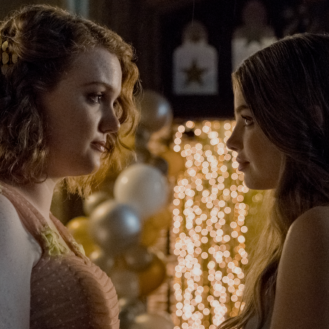By: Jolie Featherstone
Maria Schrader’s She Said is an expertly crafted investigative-newsroom drama, a la Spotlight, that solidifies Schrader as a top filmmaking talent.
She Said is a gripping recount of how The New York Times journalists Megan Twohey and Jodi Kantor uncovered years of hushed-up bullying and sexual abuse by Hollywood uber-producer Harvey Weinstein, and how they revealed it to the public in a generation-defining article that rocked the public consciousness.
Megan Twohey (Carey Mulligan of Promising Young Woman) is a reporter at The New York Times. After uncovering sexual misconduct allegations against then-presidential-hopeful Donald Trump and communicating with the victims who came forward, she receives death threats and rape threats from Trump’s ardent followers and all manner of criticism from Trump himself – all while pregnant with her first child.
Fellow NYT journalist Jodi Kantor (Ruby Sparks’ Zoe Kazan) has begun diving into a piece on sexual harassment in the workplace. As she starts researching, she finds a disturbing pattern of comments around media big wig, Harvey Weinstein.
While on maternity leave, Twohey struggles with postpartum depression. As she makes the transition between work and motherhood, she teams up with Kantor, a working mother herself, on the Weinstein piece.
As the two women navigate anonymous tips, phone calls, impromptu in-person meet-ups, in addition to interference and intimidation from Weinstein’s team, they become connected with survivors and hear their harrowing experiences.
Twohey and Kantor’s reporting resulted not only in bringing to light years of abuse by the Miramax monolith, it also caused a tidal wave of a social reckoning with North America’s rape culture and an interrogation of how sexism is baked into our structures and our psyches.
Quite refreshingly, She Said shows the utter exhaustion and always-on nature of working in the media today. Journalists hold forth to ethical practices and fact-checking in order to deliver information to the people so as to hold those in power accountable. And yet, today, journalists are attacked, figuratively and literally, at all angles all while being essential workers in a quickly changing media landscape. In order to keep one’s job, a journalist must be constantly plugged in, always available, and able to hop on calls or meet a source in the middle of the night to discuss traumatic events – all while maintaining their family and personal life. The film showed the real life sacrifices that these reporters, and their families made, in order to bring truth and justice to light.
Investigative journalism is a tough subject to film. Indeed, how do you make research, fact-checking, and email communications exciting to watch on film? Schrader’s focus on the victims, their stories and contributions to the article, helps create an emotional weight and texture to the film. On the flip side, the film’s almost proudly willful exclusion of Weinstein allows the film to transcend the barriers of a straight-up account and highlights the human toll that was taken in unearthing these stories. Credit is due to screenwriter Rebecca Lenkiewicz (Ida, Disobedience, Colette) for beautifully bringing the real-life investigation to the screen in a thrilling, pulse-pounding film that keeps you dialled in all the way through. Indeed, towards the end of the film, a major block is removed from the process and a person in the theater yelled “Yesss” in a deliriously relieved manner.
Speaking of how the film focuses on the survivors, Samantha Morton’s performance as Zelda Perkins is a gut-punch of a scene. When Perkins reveals that she was never given a copy of the gag order she was made to sign – she was given “visitation rights” – you can’t help but feel deflated. We only begin to feel the weight of suppression and hopelessness these women were confined to. When Kantor shows up at another survivor’s house, only to find out that their own husband did not know about their history of abuse at the hands of Weinstein and all of those who kept the status quo for him, it’s a searingly heart-wrenching moment. Every aspect of the survivors’ lives were dictated in some way by the abuse and retribution from Weinstein and company. So many knew and yet so few did anything to stop it.
Although it scarcely needs to be said, Carey Mulligan is one of the best actors working right now. Her performance here as Twohey is no exception. Kazan also delivers a strong performance as Jodi Kantor. Mulligan’s Twohey is steely, Kazan’s Kantor is softer – yet both are dogged in the pursuit of the truth.
Following two strong pieces, Unorthodox and I’m Your Man, Schrader is making a name for herself as a solid and trustworthy filmmaker. She Said is a masterfully-made film and one of the year’s best.
**********
Do You Tweet? Follow These Tweeple:
Jolie Featherstone: @TOFilmFiles





Be the first to comment